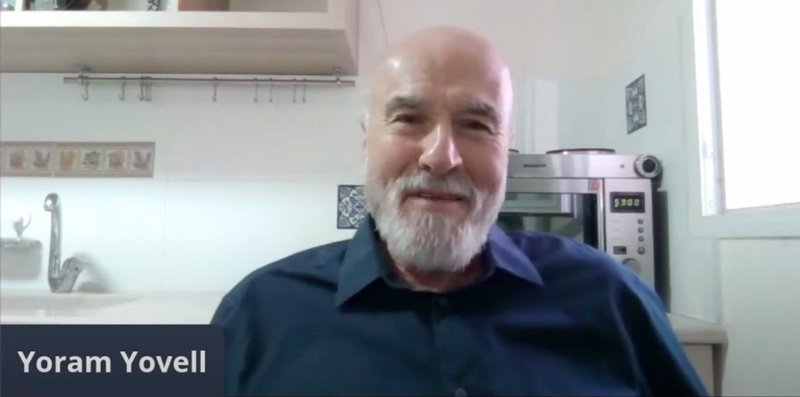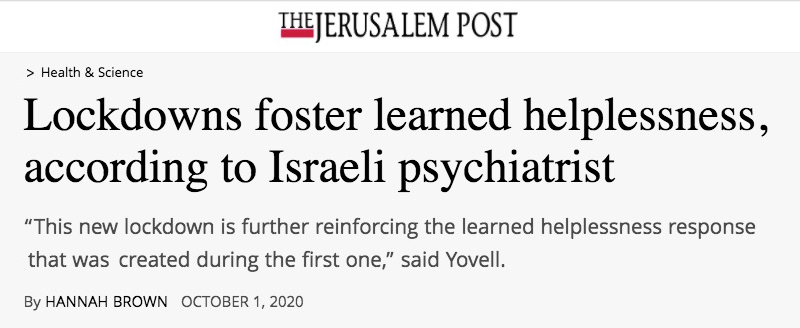Editor’s note: Prof. Yoram Yovell visited Canada last year for lectures organized by CFHU, one of which was covered by the Jewish Independent in Vancouver: “How can we be happy?”
Lockdowns foster a sense of learned helplessness in people, and this can lead to serious mental health issues, according to Prof. Yoram Yovell, a psychiatrist and brain researcher who is an associate professor in the Division of Clinical Neuroscience, Hadassah Ein Kerem Medical Center, the Hebrew University of Jerusalem.
“This new lockdown is further reinforcing the learned helplessness response that was created during the first one,” said Yovell.
Yovell is one of many members of the Israeli medical establishment who has been sharply critical of the government’s policy of lockdowns. The Israel Association of Public Health Physicians released a letter on September 17 warning of severe health consequences of allowing people to go only 500 m. from their homes and the government did change this rule to a full kilometer. Earlier in the month, 150 senior physicians discouraged the government from imposing another closure.
In a column for Ynet about the first lockdown, Yovell referenced the theory of learned helplessness, the view that clinical depression and related mental illnesses may result from a real or perceived absence of control over the outcome of a situation. He went on to describe the complex experiment – that would be controversial when considered in light of today’s standards of humane treatment for animals – by an American psychologist named Dr. Martin Seligman in 1967 at the University of Pennsylvania, from which the concept of learned helplessness was created. Dogs were given electric shocks and could press bars to try to stop them, but the bars did nothing. When they were transferred to a different environment where they could stop electric shocks by taking action, they had become too demoralized and passive to move. Even when they were placed in cages they could easily have escaped, they simply sat and howled as the electric shocks continued.
“When someone is made to feel that he has no way to change his situation, that is, that the bad things that happen to him are out of his control, he will remain passive even when he has the opportunity to save himself – he will go like a sheep to the slaughter,” said Yovell. “The recipe discovered for making people submissive and obedient is alive and well, and I think it is central here in this country in these corona days.”

He said he felt that the government’s shifting policies, and its refusal to do focused enforcement in communities that have high infection rates – along the lines of coronavirus commissioner Prof. Ronni Gamzu’s traffic-light plan – in favor of a sweeping lockdown, have left Israelis frightened and demoralized, much like the dogs in the experiment.
Noting that he often sees drivers alone in their cars wearing masks, he said that what he considers the government’s fear-mongering “has made us all frightened, submissive and passive.”
Many other health professionals have weighed in recently with similar concerns of the impact of the lockdowns on mental health. In an article this week in Ynet, psychologist Elite Mardo of Haifa University said that there had been a 300% increase in requests for psychological treatment recently.
“Our data shows that 25% of Israelis over the age of 21 – approximately 1.2 million people – reported a deterioration in their mental and emotional state after the first lockdown, and 26% say the emotional state of their children has taken a turn for the worse,” she told Ynet. “There is a 40% increase in anxiety and depression during the current lockdown… These are catastrophic numbers.”
The symptoms of mental illness that can go along with learned helplessness are not unique to Israel, and have been reported in countries all over the world that have been locked down. In August, the Centers for Disease Control in the US published an article titled, “Mental Health, Substance Use, and Suicidal Ideation During the COVID-19 Pandemic – United States, June 24–30, 2020,” that stated, “Symptoms of anxiety disorder and depressive disorder increased considerably in the United States during April–June of 2020, compared with the same period in 2019.” The prevalence of anxiety disorders was approximately three times higher than was reported in the second quarter of 2019 (25.5% versus 8.1%) and the prevalence of depressive disorders were approximately four times higher (24.3% versus 6.5%).
Yovell said he worried that the increased mental-health stress could have long-term negative consequences for society, including an increase in suicides suicide attempts. He emphasized that the virus, although it may be harmful for the elderly and those with other illnesses, is not deadly or even serious for most others, while the lockdowns can destroy the quality of life for millions.
In these days of lockdown, he said, “People shouldn’t forget to live, relax, be less afraid, and keep your sanity.” But he acknowledged that fighting the learned helplessness fostered by the lockdown would be challenging for many.

